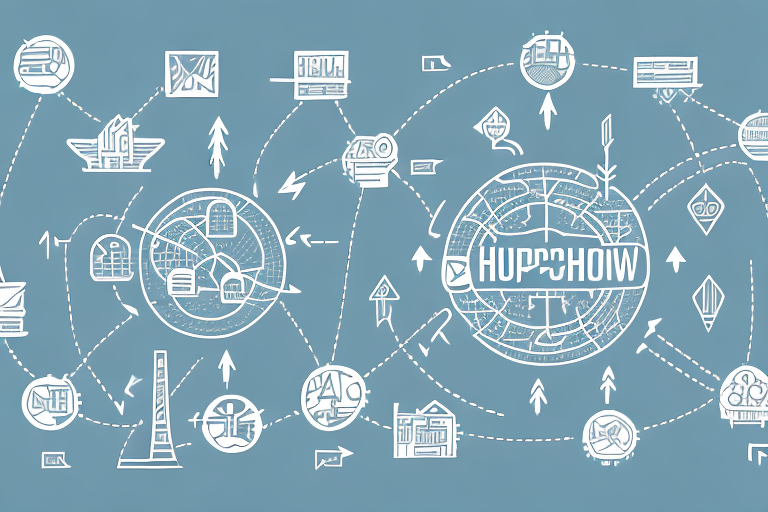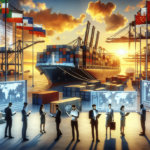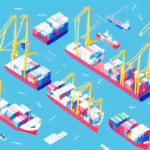Understanding Direct and Indirect Customs Representation in the Supply Chain
Importing and exporting goods can be a complex process, especially when it comes to customs regulations and compliance. Direct and indirect customs representation are two options available to businesses involved in international trade. In this article, we provide an in-depth explanation of these types of customs representation and explore the benefits and challenges of each option.
Why Customs Representation is Important for Supply Chain Management
Customs regulations ensure that goods crossing borders comply with local laws and regulations. Failure to comply can result in hefty fines, delays, and even the temporary or permanent seizure of goods. According to the World Trade Organization, non-compliance with customs regulations costs businesses billions annually in penalties and lost revenue. To avoid these risks, it is essential for businesses to have proper customs representation in place.
One of the key benefits of having customs representation is the ability to navigate the complex and ever-changing landscape of customs regulations. Customs brokers and agents possess a deep understanding of local laws and regulations, helping businesses stay up-to-date with any changes that may impact their operations. For instance, recent updates to the U.S. Customs and Border Protection regulations have introduced new compliance requirements that can significantly affect shipping timelines.
Another important aspect of customs representation is streamlining supply chain management processes. By working with a customs broker or agent, businesses can ensure that their goods are cleared through customs quickly and efficiently, reducing the risk of delays and disruptions. According to a 2023 report by Supply Chain Insights, companies with effective customs representation experience up to a 30% reduction in clearance times.
The Role of Customs Brokers in Direct and Indirect Representation
A customs broker is a professional authorized to act on behalf of importers and exporters to ensure that their goods comply with customs regulations. In direct customs representation, the importer or exporter employs a customs broker to handle all aspects of customs clearance. In contrast, indirect customs representation involves engaging a customs broker through a third-party intermediary, such as a freight forwarder, to manage customs clearance on behalf of the importer or exporter.
Customs brokers play a crucial role in international trade by providing expertise in customs regulations and procedures. They are responsible for ensuring that all necessary documentation is completed accurately and on time, and that all fees and taxes are paid in full. Additionally, customs brokers offer valuable advice on trade agreements, tariffs, and other trade-related issues that can impact the import or export of goods. By working with a customs broker, importers and exporters can streamline the customs clearance process and avoid costly delays or penalties.
Benefits of Direct Customs Representation for Importers and Exporters
Direct customs representation allows importers and exporters to have greater control over the customs clearance process. By employing a customs broker directly, businesses can ensure that their customs documentation is accurate and complete, reducing the risk of delays or fines. Additionally, direct representation often results in faster clearance times and enhanced visibility into the customs clearance process.
Another significant benefit of direct customs representation is the ability to receive personalized advice and guidance from the customs broker. This includes assistance with navigating complex regulations and requirements, as well as identifying potential cost-saving opportunities. By working closely with a customs broker, importers and exporters can optimize their supply chain and ensure compliance with all relevant laws and regulations.
Advantages and Disadvantages of Indirect Customs Representation
Indirect customs representation is often favored by small or medium-sized businesses that lack the resources to employ a customs broker directly. By utilizing the services of a freight forwarder, for example, these businesses can benefit from reduced costs and access to specialized expertise. However, working with a third-party intermediary can also result in potential delays or communication issues, impacting the timely clearance of goods.
Another advantage of indirect customs representation is that it allows businesses to focus on their core competencies rather than spending time and resources on customs procedures. This can lead to increased efficiency and productivity, as well as a better customer experience. Additionally, indirect representation provides businesses with greater flexibility, allowing them to choose from a range of service providers to find the one that best meets their needs.
On the downside, businesses may have less control over the customs process when using indirect representation, relying on a third-party to handle it on their behalf. This can lead to a lack of transparency and visibility, which could be problematic if issues arise. Furthermore, businesses may be held liable for any errors or omissions made by their representative, potentially resulting in financial penalties or legal action.
How to Choose the Right Customs Representation for Your Business
Choosing the right customs representation depends on several factors, including the nature of your goods, the frequency of your international shipments, and your internal resources. Direct representation may be the best option for businesses with high volumes of international shipments or complex goods requiring specialized expertise. Conversely, small businesses with occasional international shipments may find indirect representation to be more cost-effective.
Another important factor to consider is the level of communication and support required. Some businesses may prefer a representative who provides ongoing support and guidance throughout the customs process, while others may only need assistance with specific shipments or issues.
It is also crucial to research and compare the fees and services offered by different customs representatives. Some may offer additional services such as compliance consulting or trade agreement analysis, while others may have lower fees but limited services. By carefully evaluating your business needs and comparing your options, you can choose the customs representation that best fits your budget and requirements.
Common Challenges Faced by Customs Representatives in the Supply Chain
Customs clearance involves a range of challenges, such as incomplete documentation, discrepancies between shipping and commercial documentation, and issues with the physical inspection of goods. Effective customs representation requires expertise in navigating these challenges and ensuring that all documentation and procedures comply with local customs regulations.
Another common challenge is dealing with unexpected delays in the supply chain, caused by factors like weather conditions, port congestion, or customs inspections. Customs representatives must adapt quickly to these situations and work with all parties involved to minimize their impact on the supply chain.
Additionally, customs representatives may face challenges related to the classification of goods. Different countries have varying classification systems, making it difficult to determine the correct classification for a particular product. Incorrect classification can result in delays, fines, or even seizure of the goods. Customs representatives must thoroughly understand the classification systems in the countries they operate in and collaborate closely with importers and exporters to ensure that goods are properly classified.
Compliance Requirements for Direct and Indirect Customs Representation
Both direct and indirect customs representation require compliance with local customs regulations. Customs brokers and freight forwarders must be licensed and authorized to act on behalf of importers and exporters. They must ensure that all documentation is complete and accurate, and that all required fees and taxes are paid in a timely manner.
Compliance requirements can vary depending on the country of import or export. For example, some countries may require additional permits or certifications for certain types of goods, such as hazardous materials or agricultural products. Customs representatives must stay up-to-date on these regulations to ensure compliance and avoid costly delays or penalties.
In addition to regulatory compliance, customs representatives must prioritize security measures. This includes verifying the identity of the importer or exporter and ensuring that the goods being transported are not a security risk. Customs representatives may be required to perform physical inspections or use advanced technology to scan shipments for potential threats.
The Impact of Customs Regulations on International Trade
Customs regulations significantly impact international trade by adding complexity and cost to the supply chain. However, they are necessary to ensure that goods are safe and compliant with local laws and regulations. By working with effective customs representation, businesses can facilitate the customs clearance process and minimize the impact of regulations on their operations.
Businesses engaged in international trade must stay up-to-date with changes in customs regulations. According to the International Trade Administration, regulatory changes can occur frequently, requiring businesses to adapt quickly to remain compliant. Failure to comply can result in delays, fines, and even the seizure of goods. Additionally, customs regulations can vary greatly from country to country, making it essential for businesses to thoroughly understand the regulations in each market they operate in.
By staying informed and working with experienced customs professionals, businesses can navigate the complexities of customs regulations and ensure the smooth flow of goods across borders.
How Technology is Changing the Game for Customs Representation in the Supply Chain
Advancements in technology, such as automation, data analytics, and artificial intelligence, are transforming the customs clearance process. These tools help customs brokers and freight forwarders streamline documentation, reduce errors, and improve the efficiency of the customs clearance process.
For example, blockchain technology is being utilized to enhance transparency and traceability in the supply chain, ensuring that all parties have access to accurate and real-time information. Additionally, AI-powered systems can predict potential delays and suggest optimal routes, further enhancing the efficiency of the customs process.
According to a 2023 study by ShipScience Technology Insights, businesses that adopt advanced technologies in customs representation can reduce clearance times by up to 25% and decrease compliance-related errors by 40%.
The Future of Customs Representation: Trends and Predictions
The customs clearance process is expected to continue evolving as new technologies and regulations emerge. Businesses that stay abreast of trends and predictions in customs representation will be better positioned to adapt and succeed in the future.
Key trends include the increased use of artificial intelligence and machine learning to automate and enhance the accuracy of customs processes, the growing importance of data security and blockchain for transparent and secure transactions, and the integration of Internet of Things (IoT) devices to provide real-time tracking and monitoring of shipments.
Furthermore, global trade agreements and regulatory harmonization efforts may simplify customs procedures, making it easier for businesses to navigate international markets. Staying informed about these developments and investing in the right technologies will be crucial for businesses aiming to maintain a competitive edge.
Best Practices for Successful Direct and Indirect Customs Representation
Effective customs representation requires expertise and attention to detail. Here are some best practices for successful direct and indirect representation:
- Engage Reputable Customs Brokers or Freight Forwarders: Partner with experienced and reliable professionals who have a proven track record in customs representation.
- Maintain Accurate and Complete Documentation: Ensure that all required documents are correctly filled out and submitted on time to avoid delays and penalties.
- Stay Informed on Regulatory Changes: Regularly update your knowledge of current customs regulations and compliance requirements.
- Implement Robust Communication Channels: Establish clear lines of communication between your business and your customs representatives to address issues promptly.
- Leverage Technology: Utilize advanced software and tools to streamline customs processes and improve accuracy.
- Conduct Regular Audits: Periodically review your customs procedures and documentation to identify and rectify any potential issues.
Case Studies: Real-Life Examples of Effective Customs Representation in the Supply Chain
Real-life case studies provide valuable insights into successful customs representation practices. For example, TechCorp, a leading electronics manufacturer, partnered with a specialized customs broker to manage their complex import and export operations. By leveraging the broker's expertise, TechCorp reduced their customs clearance times by 20% and minimized compliance-related issues, resulting in significant cost savings and improved supply chain efficiency.
Another example is Foodies International, a food distribution company, which utilized indirect customs representation through a trusted freight forwarder. This approach allowed Foodies to focus on their core business while ensuring that all their shipments complied with international food safety standards, leading to enhanced customer satisfaction and market expansion.
Tips for Reducing Costs and Streamlining Processes with Customs Representation
Customs representation can be a significant cost for businesses involved in international trade. However, several strategies can help reduce costs and streamline processes:
- Consolidate Shipments: Combining multiple shipments into a single consignment can reduce overall shipping and customs clearance costs.
- Maintain Accurate Documentation: Ensuring all paperwork is correctly completed reduces the risk of delays and penalties, saving both time and money.
- Leverage Technology: Implementing automated systems for documentation and tracking can enhance efficiency and reduce labor costs.
- Negotiate Fees: Work with your customs broker or freight forwarder to negotiate better rates based on your shipping volumes.
- Stay Informed on Tariffs and Duties: Understanding current tariffs and duties can help you make informed decisions about sourcing and pricing strategies.
- Invest in Training: Educating your staff on customs procedures and compliance can prevent costly mistakes and improve overall efficiency.
Understanding Customs Duties, Tariffs, and Taxes in Direct and Indirect Customs Representation
Customs duties, tariffs, and taxes vary depending on the nature and origin of the goods being shipped. Customs brokers and freight forwarders must ensure that all customs fees are paid promptly to avoid fines and delays. Importers and exporters should be aware of these fees and incorporate them into their total cost of goods sold.
For example, the Harmonized System (HS) code classification determines the duty rates applicable to specific products. An accurate HS code can significantly impact the total customs fees. According to the Warehouse Logistics Report 2023, incorrect HS code classification can increase duties by up to 15%, affecting overall profitability.
Additionally, free trade agreements (FTAs) between countries can offer reduced or zero tariffs for qualifying goods, provided the necessary documentation is in place. Understanding and leveraging these agreements can result in substantial cost savings.
Conclusion
Direct and indirect customs representation are essential options for businesses involved in international trade. Each has its benefits and challenges, and the choice depends on several factors including shipment volume, complexity of goods, and available resources. By understanding the regulations and requirements involved in customs representation, businesses can minimize risks, reduce costs, and streamline their supply chain processes. Partnering with experienced customs professionals and leveraging technology will further enhance efficiency and compliance, ensuring the smooth flow of goods across borders.




















